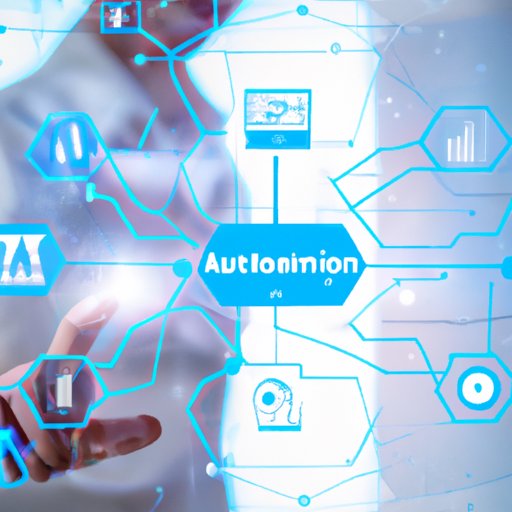Introduction
Artificial intelligence (AI) is rapidly transforming many industries, including accounting. The potential for automation and increased accuracy has many wondering if AI will eventually replace the need for accountants. In this article, we’ll explore the potential impact of AI on the accounting profession, looking at how it might change the role of accountants, create new job opportunities, and affect the accuracy and efficiency of financial operations.

Examining the Impact of AI on Accounting Professionals
As AI continues to evolve, it’s becoming increasingly capable of automating mundane tasks that have traditionally been done by humans. This raises questions about the future of the accounting profession and the potential for job losses due to automation. According to a recent survey by the American Institute of CPAs, nearly half of all accounting professionals are concerned that their jobs will be replaced by AI in the near future.
However, while AI may replace some roles, it may also create new job opportunities. As AI evolves, so too must the skills and knowledge of accountants. AI-enabled accounting requires a deeper understanding of advanced analytics, data science, and other cutting-edge technologies. This could lead to new job opportunities for those with the right skills.

Exploring the Potential for Automation in Accounting
AI can automate many of the tedious, time-consuming tasks associated with accounting. From bookkeeping to data analysis and fraud detection, AI can perform these tasks faster and more accurately than humans. AI-driven solutions such as robotic process automation (RPA) can even automate entire processes, from start to finish.
For example, AI-powered solutions can be used to automate invoice processing, which is often a time-consuming task for accountants. AI solutions can read invoices, extract relevant information, and enter it into the system—all without any human intervention. Similarly, AI can be used to automate payroll processing, eliminating the need for manual data entry.
While automation can bring many benefits, there are also challenges associated with it. For example, AI systems require significant amounts of data in order to function properly. If the data is incomplete or inaccurate, the results of the AI system may be unreliable.
Assessing the Benefits and Drawbacks of AI-Enabled Accounting
The use of AI in accounting can bring many benefits, including increased accuracy and efficiency. By automating mundane tasks, AI can free up time for accountants to focus on higher-value activities. AI can also reduce the risk of errors, as it is less prone to mistakes than humans.
In addition, AI-enabled accounting can help businesses save costs. By automating tasks such as invoice processing, businesses can drastically reduce their labor costs. AI-powered fraud detection solutions can also help businesses identify and prevent fraudulent activity, saving them money in the long run.
However, there are also drawbacks to using AI in accounting. AI systems can be biased if they are not trained properly, leading to inaccurate results. Additionally, AI systems require significant amounts of data in order to function properly, which can be difficult and costly to obtain.
Comparing Traditional Accounting Practices to AI-Driven Solutions
Traditional accounting practices have several advantages over AI-driven solutions. For example, humans are better able to interpret complex data and identify patterns. Additionally, humans are better able to communicate with clients and build relationships. Finally, humans are better able to understand the nuances of each situation, enabling them to make better decisions.
On the other hand, traditional accounting practices also have certain drawbacks. For example, humans are prone to making mistakes, which can lead to costly errors. In addition, manual processes can be time-consuming and inefficient. Finally, traditional accounting practices often require large amounts of paperwork, which can be difficult to manage.
In comparison, AI-driven solutions offer several advantages. AI-powered solutions can automate mundane tasks, freeing up time for more value-added activities. AI can also reduce the risk of errors and uncover patterns that are difficult for humans to detect. Finally, AI can help businesses save costs by reducing labor costs and identifying potential fraud.
Investigating the Future of the Accounting Profession with AI
As AI continues to evolve, it will shape the future of the accounting profession. Accountants of the future will need to possess a deep understanding of advanced analytics, data science, and other cutting-edge technologies. They will also need to be proficient in communication and relationship building, as AI won’t be able to replace these important skills.
The adoption of AI-driven solutions will bring both challenges and opportunities. On the one hand, AI can automate mundane tasks and reduce the risk of errors. On the other hand, AI-enabled accounting will require accountants to develop new skills and knowledge in order to remain competitive.
Conclusion
AI is rapidly transforming the accounting profession, with the potential to automate mundane tasks and increase accuracy. While AI may replace some roles, it could also create new job opportunities for those with the right skills. Ultimately, AI-enabled accounting could bring many benefits, including increased efficiency and cost savings. However, AI systems can also be prone to bias and errors, and traditional accounting practices still have their advantages. As AI continues to evolve, the accounting profession will need to adjust and adapt to stay competitive in the future.
(Note: Is this article not meeting your expectations? Do you have knowledge or insights to share? Unlock new opportunities and expand your reach by joining our authors team. Click Registration to join us and share your expertise with our readers.)
